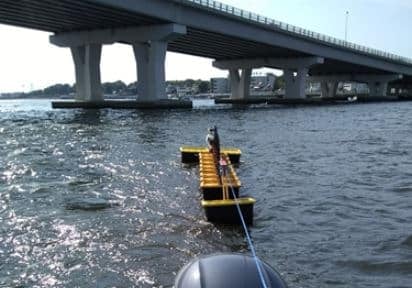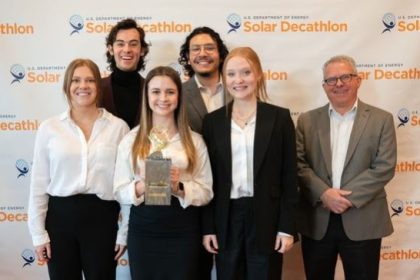Three Firms Share in $500K Prize Aimed at Harnessing Energy From the Sea

WASHINGTON — Maiden Wave Energy, of Philadelphia, Pennsylvania, is one of three winners of a federal contest to come up with unique ways to capture marine energy to power hurricane-monitoring systems.
The company, which filed its first patent for an ocean energy capture device in 2007, is receiving $275,000 through the BUILD contest run by the Department of Energy and the National Oceanic and Atmospheric Administration.
Wave Powered Oceanographic Gliders, a partnership between Moye Consultants LLC and Wave Venture based in Tallahassee, Florida, will receive $175,000, and Kevin Lu, a mechanical engineer based in Los Angeles, California, will receive $50,000.
The BUILD contest is the second phase of the larger Powering the Blue Economy™: Ocean Observing Prize DEVELOP Competition.
The prize challenges competitors to develop solutions that use marine energy to power hurricane-monitoring systems.
“We’re thrilled to receive this award from the Department of Energy and NOAA,” said Solomon D. Spector, co-founder/inventor of Maiden Wave Energy, in an email to The Well News.

“This achievement and the prize money will enable us to design and build version 8 of our wave energy harvesting autonomous surface vehicle,” he said.
In June, the competitors gathered at the Naval Surface Warfare Center’s facility in Carderock, Maryland, to test their early stage prototypes in the facility’s Maneuvering and Seakeeping Basin, also known as the U.S. Navy’s indoor ocean.
The basin holds more than 12 million gallons of water and can simulate diverse wave conditions, helping uncover the capabilities of new wave-powered technologies.
During testing, the teams assembled their devices, and crews placed each wave-powered prototype in the MASK to see how it weathered a variety of wave conditions. This allowed the teams to demonstrate how their prototypes collect data and recharge with wave power.
Each prototype was then evaluated on its ability to collect data, maneuverability, power and mission compliance (like operations, safety, size and weight).
Two of the prototypes powered themselves using energy they generated — showing that wave power has the potential to enhance the endurance and capability of uncrewed ocean-observing platforms. These prototypes met testing expectations and helped identify future research opportunities for marine energy-powered ocean-observing platforms.
The organizers are now evaluating next steps for the Ocean Observing Prize and exploring how best to advance and further test these early stage prototypes.
“Ocean observing systems are gathering key information 24 hours a day, seven days a week all over the world,” said Nicole LeBoeuf, director of NOAA’s National Ocean Service, in a written statement.
“Harnessing the energy of waves to power our observation networks is a win-win and helps us meet some of our most critical missions. This kind of creativity is also an exciting part of the new blue economy,” LeBoeuf added.
Maiden Wave Energy’s Rover technology started out as a series of simple wooden dowel and tupperware prototypes that Spector created in his garage.
“Those early experiments eventually brought us forward to the point of making 42 attempts at real-world trials to harness the simple up and down motion of wave energy,” Spector said. “We hope the information that was learned from the wave test tank at the Naval Surface Warfare Center’s facility in Carderock, Maryland, will ultimately lead to greater efficiency of our technology.”
Since 2019, the Ocean Observing Prize competitors have proposed new ways to integrate marine energy with ocean-observing technologies, including weather buoys, cabled arrays and uncrewed underwater vehicles.
Marine energy-powered devices could eventually lengthen deployments at sea to provide more coverage and collect higher-resolution data that forecasters can use to more accurately predict hurricane intensity and paths.
“Marine energy can enable ocean-observing systems to stay at sea longer and explore more of our oceans, by providing on-site power,” said Kelly Speakes-Backman, principal deputy assistant secretary for Energy Efficiency and Renewable Energy, in a written statement.
“The solutions developed in the Ocean Observing Prize will help us gather higher-quality and more complete data on our oceans, weather, and atmosphere, helping us better protect communities from hurricanes,” Speakes-Backman said.
Spector said he and his colleagues hope to continue their research and development of the prize-winning entry.
“We also invite those interested to visit us at the upcoming Oceans Conference in Virginia Beach, [Virginia], on Oct. 17-21 or to reach out on our website www.maidenwave.com,” he said.
Dan can be reached at [email protected] and @DanMcCue























